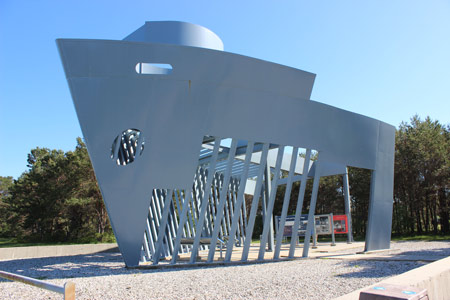
Cushing’s Point, South Portland, Maine. Shipyard memorial, to scale from the waterline up, is for the wartime shipbuilding project there which began in the 1940s. Between 1941 & 1945 two yards built 30 “Ocean” cargo ships for Britain and 244 Liberty cargo ships under the lend-lease program, all 442' long. Under eminent domain Cushing’s Point had been cleared of homes. The yards soon employed 30,000 workers. New methods included welded hulls and basin built mass production. See Cushing’s Point. Fishermen’s Voice photo
Lobster Industry Grapples with Climate Change
by Laurie Schreiber
PORTLAND—Maine’s lobster fishery has sustained many local communities for well over 100 years, persisting when other fisheries have either declined or crashed.
But some interesting times for the American lobster could be coming. What that means for the future in these uncertain times is unclear.
That was the thought among Maine-based speakers at the 11th International Conference on Lobster Biology and Management, hosted in Portland from June 4-9 by the University of Maine and Boston University.
Lobster is currently close to 80 percent of the value of Maine’s fisheries. There are 4,500 active lobster licenses in Maine.
“This is fundamental to the identity of coastal Maine, and fundamental to the resilience of our coastal communities,” said Carl Wilson, director of the Department of Marine Resources’ Bureau of Marine Science. “We’re also told the Gulf of Maine is one of the fastest-warming bodies of water in the world. That’s significant.”
If there’s going to be rapid change in the resource, the industry has to be in front of the conversation, Wilson said.
David Cousens, president of the Maine Lobstermen’s Association (MLA), offered a snapshot of how the fishery has changed in






